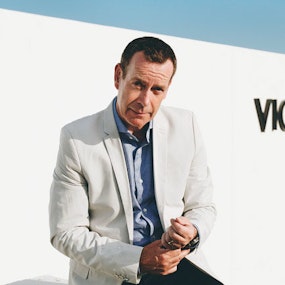Creating A Culture of Belonging To Enable Consistent Individuality - Bill Walshe
Do you want to attract talented people, and not only keep them in your organization but keep them happy and effective in delighting your guests and customers?
Our guest today, Bill Walshe, is a global hospitality leader and the former CEO of The Viceroy Hotel Group. Today, he’s helping others in hospitality as a board member and strategic advisor - and in this episode, you’ll learn why belonging is the key to success today, and how you can transform your culture to create an environment where everyone feels like they can truly belong.
Join in the conversation on this episode on the Hospitality Daily LinkedIn page here.
This episode is brought to you with support from Actabl. Discover the power of actionable insights with the software company dedicated to meeting the evolving needs of leading hospitality businesses. Actabl's suite of leading solutions, including ProfitSword's AI-powered business intelligence, Hotel Effectiveness' labor optimization, ALICE's operations management, and Transcendent's asset management, harmonize data, work, and people seamlessly. By hoteliers for hoteliers, Actabl is the key to elevating profits and guest experiences. Explore the possibilities at actabl.com and unlock the potential of your hospitality business today.
Josiah How would you define organizational culture? What is that to you?
Bill I think organizational culture right now is something that needs to transform in the way it is applied, and activated, and the perception of it and the labels that are forced upon it. So one of the things that has historically been at the heart of culture in a hospitality organization has been the word satisfaction. We have colleague satisfaction, staff satisfaction surveys, and we say, are you satisfied? I don't know about you or your listeners, but I don't often use that word when I'm trying to be a human being talking to other human beings. If I'm out for dinner, I don't say, are you satisfied with the food? It's like, are you having a good time? Do you love it? Are you happy that you're here? Those are the things. So what I'm seeing, thankfully, occur not only in our industry but in industries in general, is this progression from this concept of the holy grail of culture being satisfaction to it being belonging. Ultimately, I think that the objective of any culture in any organization is to create an environment in which everybody feels that they belong, irrespective of the idiosyncratic differences that exist between us. And I think now more than ever, the obligation on hospitality leaders to recognize that our industry is the single largest employer in the world. That's a huge opportunity to create positive global cultural growth, but it's also a huge obligation for us to lead our businesses in the right way. So irrespective of race, religious belief, nationality, or identity, an organization has to create a culture that is robust enough that there's enough for any individual to connect with an element that is sufficient for them to say, I belong. And we don't have to create something that ticks 100% of the boxes for everybody in the organization, because that's, frankly, impossible to do. But we need to move on from what culturally the focus used to be, which is, let's please the most amount of people that we can in the best way possible and ignore everybody else. This has to be more about creating the sense of inclusion so that eventually we're going to our teams and we're not saying, are you satisfied? we're saying, do you belong? And effectively, what we're saying is, are you proud? It's back to this conversation of pride. I used to do this thing, Josiah, where I would challenge leadership teams to take pointless conversations and make them magic conversations using one word. And I'll give you an example of how you can do that. If you're the general manager of a hotel, and you're walking down a corridor, and you see a member of the housekeeping team walk towards you, perhaps that person's name is Fred. And you say, morning, Fred. How are you? And Fred will look at you and go, morning, Mr. Walsh. Yeah, I'm fine. And everybody moves on. And there has been zero change to anybody's life from that robotic practice muscle memory conversation. I think to begin with, we need to ban in hospitality, the acceptance of the word fine. It's a profanity. It's a four-letter F-word profanity that's even worse than the one you're all thinking about now. "Fine" is the utter expression of mediocrity and hospitality. And if we ever accept that something is fine, we shouldn't be in this business. So in order to change that, insert one word. Walk down the corridor, you see Fred from housekeeping. Morning, Fred. Not, how are you? Morning, Fred. How proud are you? And Fred will stop, think you're a lunatic, but think about an answer, and it will lead to a conversation. One word has changed a complete waste of time into conversation, that something might fundamentally change the way that business operates based on the input you're likely to receive from a front-line colleague. So is it comfortable to do? No. Does it come naturally? No. But I'd encourage your listeners, to get out of their comfort zone and try to create a culture that is based on meaningful interactions and not just robotic pleasantries.
Josiah Words matter. And what you shared is a pattern interrupt, right? It forces us to think differently. I do want to ask you, though, a follow-up on what you just shared, though. Why is belonging so important? Why does it matter now?
Bill I think belonging matters now more than ever because of the tolerance of the generations that have recently emerged and that will soon emerge into hospitality, both as colleagues and as customers, their tolerance is the lowest that has been in history. And I think that for years, people put up with being somewhere that they didn't feel they connected to the values of, that they didn't feel identified them in an appropriate way, perhaps didn't respect them enough, because that's what you did. We grew up in a generation of, when you start a job, don't say anything for the first three years. Just do what you're told, show up to work, and change jobs too frequently will reflect poorly on you from resume terms. The young generation in the workplace today, and those that are emerging in the near future, don't subscribe to that. If I'm not respected, if I'm not included, if I'm not conversed with, if I don't have a voice, ergo, if I don't belong, I leave. And they do. And they have no hesitation to do so. And there is now sufficient competition in the workplace that they can And we all know that frequency of turnover, if turnover is too high in a hospitality business, affects the ability to deliver wonderful experiences on a consistent basis. That's one of those elements of consistency that we talked about earlier, is the consistency of the presence of people who understand what the company they work for stands for, who subscribe to those ideals, who've had an opportunity to influence those ideals in the first place, and therefore feel that they belong. And the same goes for the guest. I think our guests want to deliver what I call contribution without compromise. There's such a degree of choice in luxury hospitality today that just saying we have great beds or lights. And our coffee is strong. Every single hospitality organization in the world can make those same statements. So what is it that will make a guest come and then come back to our organization? I think it is not compromising on those minimum expectations of what luxury service and a luxury experience look and feels and taste like. But beyond that, they believe that the dollars they're spending to acquire that are going to an organization that shares their values. So contribution without compromise is this young generation saying we want to save the world. We want to do it. in an infinity pool, sipping a mojito, and we don't want to have to break a sweat doing it. We want to know that by choosing to give our dollars to Hotel X versus Hotel Y, Hotel X has a stated commitment to invest in their local community, to make the world a better place. And that's created an uncomfortable environment for luxury hospitality leaders because we were taught, to never comment on anything, because you don't want to risk upsetting anyone. And those days are gone. We have to. And you're seeing more and more luxury hospitality brands standing up for minorities. You're seeing more and more luxury hotel brands saying, you know what, We don't interact with the LGBTQ+ community in the way that we ought to. We haven't put the effort in. We don't have a dialogue and we're going to get better at that. And that community will react very positively and say, we'll help you. That's back to asking for help. We set up an advisory board advisory a few years ago. We went to some leading travel agents who specialize in LGBTQ+ travel. And we said, hi, we're Viceroy and we suck at this. Can you help us get better? And we really don't know where to start. And as CEO, I'm kind of afraid to start because I don't want to get canceled by doing the wrong thing. It would be easier to do nothing. And the reaction from people within the industry just to being asked for help was unbelievable. We ended up having some amazing dialogue that led us to programming and activation for a community that we would never have thought of were it not for getting the input from these incredible folks who were committed to helping us. Because we wanted to say that Viceroy at that time, we created a phrase called Viceroy for Everyone. And that was our commitment to say, we'll create a company where we're going to work tirelessly to ensure that whoever you are, there is a sense of belonging when you come to a Viceroy Hotel. And I believe it's never been more important.
Josiah I'm really fascinated to get your perspective on leadership. And I appreciate you going into some of these details because I feel the lessons are in what you're sharing. And I think even on that example, this wasn't just someone on your people team that you sent off to go do some work. I think as the leader, the actions, and how you allocate your time, we're all dealing with finite calendars and time. You saying, this is important enough. I'm going to personally do this. I'm going to have these conversations and say what you just shared sets the tone in an organization, right? And it sets the tone in the broader travel community. So I think that's really interesting. I think the other thing I want to call out, make sure our listeners don't miss, is as you were talking about culture and as you're talking about belonging, I sensed a similarity between how you want to show hospitality to guests as well as show hospitality to your associates and potential people that will work with you, right? And it seems like that is becoming more and more blended. And it's one and the same. You don't just have the recruiting strategy and then you have the guest strategy. It seems like this is who we stand for. These are our shared values. It's hopefully going to attract guests and attract talented team members. Is that a fair summary of how you think about that?
Bill It very much is, to the point that you made first off about being seen as the leader to champion what you're talking about. You also have to be seen to put into effect what you're talking about. I mean, I could talk for hours in an organization that I was leading about this idea of belonging and being committed to creating that. And then three months later, people receive a colleague satisfaction survey in their inbox, and they don't. So we changed it and we changed the label. And we said this is a belonging survey. And we went to a different provider who wasn't the kind of typical quintessential hospitality satisfaction survey purveyor. And we went out to other industries. Much of what I talk about and much of what we achieved was by looking beyond the parameters of hospitality and looking at what other organizations were doing, particularly in the areas of culture creation, DEI, inclusion, and belonging. But you've got to be prepared in the very short term to evidence through actions the commitments that are being verbalized. Otherwise, people will just glaze over. And again, folks that are coming into the workplace today, it's the highest level of education and articulation and sophistication that we've ever had, having colleagues come into hospitality, and what they bring with them is a BS radar that goes off very, very quickly. And so as a leader, if you're going to say you're going to do something, don't say it until you know how you're at least going to have one quick win. how you're going to evidence the path that you say that you're going to be on. So yeah, I think that in leadership, it's about being present, standing up, being counted and getting things done. Sorry Josiah, you can have this later. What was the second part of the question?
Josiah Oh, I was just playing back at what I think you said about having a similar approach to how you engage, like showing hospitality to guests. It sounded like was similar to showing hospitality to potential associates or your team. So you don't have these bifurcated approaches. It's this is who we are and this is who we're welcoming people.
Bill 100%. I mean, a hotel, a resort, a restaurant, any hospitality environment is filled with humanity. And I don't believe we should have distinctions in terms of, our willingness to commit to interacting with every human being in an equal manner, just because they're fallen to guest category or colleague category. I mean, you know, The guest is a colleague who's not working. A colleague is a guest who also has a day job. And I say that in terms of the application and the activation of ideology. So if I just give you an example of the lines that I believe in, in terms of activating an ideology for hospitality, and we'll see that they apply equally to colleagues and to guests, being a host first and always. A host is somebody who cares about the people in their care. As hospitality hosts, our obligation centuries ago, when people would be traveling on foot on long, arduous and dangerous journeys, is to keep people safe, warm and nourished. Hasn't changed. I mean, it's cooler what we do now. And it's more modern, there's more bits. And that obligation to be a human being looking after another human being, it applies equally to a colleague in the business that you run or a guest who's staying in the business that you run. Being thoughtful in the detail, making people expect the remarkable. embracing the impossible, having the courage to say yes when others dare not, giving yes as a first response to people, believing in authenticity, celebrating individuality, creating sensation and inspiration, being an unabashed provocateur, and making people proud. Where would we create a line of distinction as a leader between wanting to deliver that commitment to a staff member or a guest? It applies equally in my eyes to both. The activation might differ. It may apply in different ways. But the commitment back to that idea of intention, the intention should be to be able to articulate your ideology to have a purpose focus and to have the desire to apply it to every human being with whom you interact irrespective of the label that they may or may not carry.
Josiah That makes sense. I wonder if we could speak a little bit, Bill, to some of the challenges, the structural challenges in the industry that hold people back. I think you alluded to some of the personal challenges people maybe don't feel the confidence to talk to their leaders about. I don't know. There could be laziness, this inertia holding us back. But this is not a specific device, right? You're sitting on boards. You've worked across a number of organizations. I'm curious about structural changes. And the reason I'm asking is because we have a lot of investors listening. We have a lot of people from brands listening, to management companies. There's a lot of people across the ecosystem. I'm curious about the structural things in the way that the hospitality industry does business that are holding us back from operating in this way. And I want to talk about this because I want to kind of address it and get through it. But I'm curious what you've seen.
Bill I think this opens up a conversation that is extremely important, is very nuanced, and my answers will invariably upset and perhaps offend some categories of listeners, and I really don't care. I think that the way that we need to evolve structurally is to move away from leadership complacency when it comes to looking at the workforce and hospitality. And I think historically, if we're honest with ourselves, Our view was, they're lucky to be here. I mean, look where they're working. It's gorgeous. And these luxury hotels. And they get nice uniforms. And they're lucky. And they'll come in at an entry-level position. And if they make supervisor, maybe we'll learn their name. And beyond that, I think I'm going to be extreme in my view here, just for devil's advocate purposes. I think we created the sensation through frontline employees and colleagues across hospitality organizations that they were what the British army used to call them in the First World War, cannon fodder, you know, send them over, send them over the trench. And if they get taken down, well, send some more. And I think that people at the front line of hospitality thought we are just that, you know, we're disposable, we're dispensable. And we ought to feel lucky to be here. I have a completely different view. I think if you're a leader in hospitality, what you should do each and every day is walk around your business and from the most junior to the most senior, say thank you. Thank you for being here. Thank you for choosing to come and work as part of my team. Thank you for remaining as part of this team. Am I doing what I need to do to keep you here even longer? What can I do to make you feel prouder? I spent years coaching sales teams, and I always used to say to the salespeople, that there are only two things you need to do as a salesperson, and every action in sales leads back to one of these two questions that you should ask yourself every day. One, are we asking for the business? Two, are we easy to do business with? When it comes to colleague interaction, I'm going to change that a little bit. Asking for the business, are we asking people, are we giving people a reason to trust us with their career? Easy to do business with? are we good people to do business with? When those folks make arguably the most important decision in their life, which is where am I going to work? Where am I going to spend the majority of my time? Who am I going to depend on for my income to pay my bills, to educate my children, in certain cases to feed my family at home and abroad? are we fulfilling our obligations to those people? And I don't know if that question gets asked enough. I've been lucky to work for some incredible mentors, people like Gerald Lawless at Jumeirah in Dubai. When I was out in Dubai, I picked up a practice watching him and others, he and Guy Crawford, that I kept going to this day. And it actually became my favorite thing to do on any of the 365 days of the year. And that is on Christmas Day, when I, as CEO, don't have to go to work. If there are hotels in the location where I am on Christmas Day, the very first thing that I will do is go and I will walk around every open and operating hotel to meet every colleague working that day to say thank you to them. And through them, thank you for their families for not having them at home the way my family was fortunate to have me at home that day. And I'm picking Christmas as a Christian holiday. You can apply it depending upon whomever we're thinking about and whatever might be occurring. You know, after a long rambling answer, I think what I would encourage hospitality leaders to do more of is kind of what our mothers brought us up to do. Say please and thank you. Please be part of my team and thank you for doing it and not to feel superior, not to feel complacent and not to judge others as being lucky to be there.

Bill Walshe
Bill Walshe is a successful Luxury Hospitality Senior Executive, with experience in The Middle East, Europe, Asia and the USA. His expertise includes creating, launching and building world class / market-leading luxury hospitality brands that are unique, differentiated, relevant and profitable. In addition to brand creation and curation, Walshe is vastly experienced in organizational growth, new market entry, revenue generation & management, distribution & digital platforms, marketing, communications and operations. He is renowned for creating hotel experiences of absolute individuality, that consistently deliver extraordinary service. He has a track record delivering rapid organizational transformations and turnarounds in highly challenging business circumstances, and for delivering premium returns for owners; both owners of the corporate entities he has led and for individual owners of managed hotel assets. Walshe is an extremely passionate culture builder, with a proven and measurable record of organizational cultural improvement, leading to market leading belonging and satisfaction metrics. Walshe is considered by peers and partners to be highly creative and innovative, with profound strategic capabilities.
For the past 11 years, Bill Walshe was CEO of the award-winning modern luxury hotel group Viceroy Hotels & Resorts. In 2022 the brand was ranked 10th in the world in the coveted Travel & Leisure World’s Best awards. In March 2023 Walshe successfully completed the sale of the group on behalf of owners Mubadala (Abu Dhabi) and stepped down a… Read More
Most Popular Episodes
Check these out:























